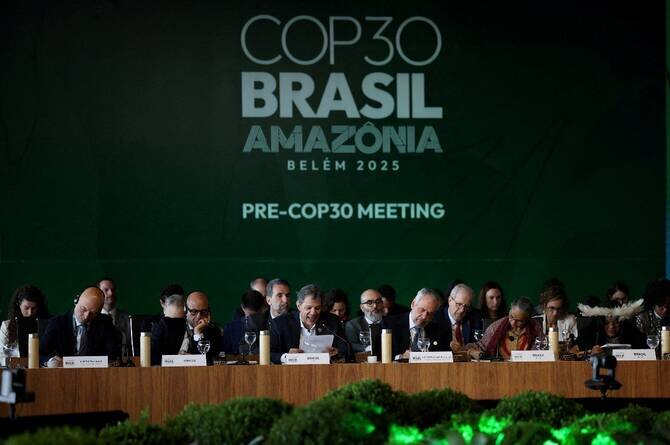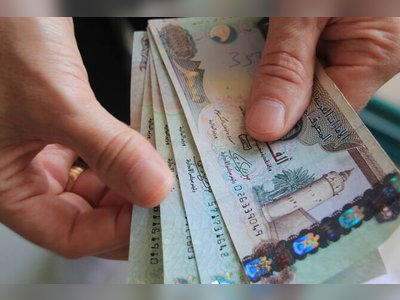
No Deal Reached on EU Climate Targets Ahead of COP30
EU member states continue negotiations on emissions targets before UN summit.
The European Union's member states have yet to agree on key emissions targets prior to the UN's COP30 climate summit in Brazil.
Brussels officials indicate that ministers will reconvene on Wednesday to finalize a deal.
Talks concluded on Tuesday without an agreement and persisted into the night.
A spokesperson for Denmark, which currently holds the EU's rotating presidency, expressed optimism about reaching a political accord, stating that a formal conclusion was expected upon resumption of discussions.
These negotiations are significant as they precede the COP30 summit next week in Brazil.
French Environment Minister Monique Barbut has emphasized the importance of securing an agreement to avoid negative consequences for the EU's reputation on the global stage.
The EU, which ranks fourth globally in terms of emissions behind China, the United States, and India, has been a leader in climate action.
It has achieved a 37% reduction in emissions compared to 1990 levels.
However, recent political shifts within the EU have placed climate concerns secondary to issues like defense and economic competitiveness.
The most pressing issue for ministers is achieving consensus on an EU emissions target for 2035, known as a Nationally Determined Contribution (NDC).
The EU aims to present a united front at COP30 with clear leadership in climate policy.
Additionally, the EU seeks to secure support from a majority of member states for future climate targets that align with its goal of carbon neutrality by 2050.
The European Commission proposed cutting emissions by 90% by 2040 compared to 1990 levels as part of this transition.
However, member states have yet to endorse the proposal, citing concerns over economic impacts on their industries.
Countries like Spain and the Nordic nations support the target, while others such as Hungary, Poland, Czech Republic, and Italy remain opposed.
To address these divisions, discussions have included various concessions for member states, including provisions for carbon credits from projects outside of Europe.
While some countries advocate for a higher threshold for these credits, environmental groups criticize the negotiations for potentially undermining EU climate goals through loopholes.
Despite this criticism, participants describe the ongoing talks as efforts to achieve positive outcomes within complex and challenging circumstances.
The EU maintains its commitment to global climate leadership, having mobilized 31.7 billion euros in public climate finance in 2024, making it the largest donor worldwide.
Brussels officials indicate that ministers will reconvene on Wednesday to finalize a deal.
Talks concluded on Tuesday without an agreement and persisted into the night.
A spokesperson for Denmark, which currently holds the EU's rotating presidency, expressed optimism about reaching a political accord, stating that a formal conclusion was expected upon resumption of discussions.
These negotiations are significant as they precede the COP30 summit next week in Brazil.
French Environment Minister Monique Barbut has emphasized the importance of securing an agreement to avoid negative consequences for the EU's reputation on the global stage.
The EU, which ranks fourth globally in terms of emissions behind China, the United States, and India, has been a leader in climate action.
It has achieved a 37% reduction in emissions compared to 1990 levels.
However, recent political shifts within the EU have placed climate concerns secondary to issues like defense and economic competitiveness.
The most pressing issue for ministers is achieving consensus on an EU emissions target for 2035, known as a Nationally Determined Contribution (NDC).
The EU aims to present a united front at COP30 with clear leadership in climate policy.
Additionally, the EU seeks to secure support from a majority of member states for future climate targets that align with its goal of carbon neutrality by 2050.
The European Commission proposed cutting emissions by 90% by 2040 compared to 1990 levels as part of this transition.
However, member states have yet to endorse the proposal, citing concerns over economic impacts on their industries.
Countries like Spain and the Nordic nations support the target, while others such as Hungary, Poland, Czech Republic, and Italy remain opposed.
To address these divisions, discussions have included various concessions for member states, including provisions for carbon credits from projects outside of Europe.
While some countries advocate for a higher threshold for these credits, environmental groups criticize the negotiations for potentially undermining EU climate goals through loopholes.
Despite this criticism, participants describe the ongoing talks as efforts to achieve positive outcomes within complex and challenging circumstances.
The EU maintains its commitment to global climate leadership, having mobilized 31.7 billion euros in public climate finance in 2024, making it the largest donor worldwide.










